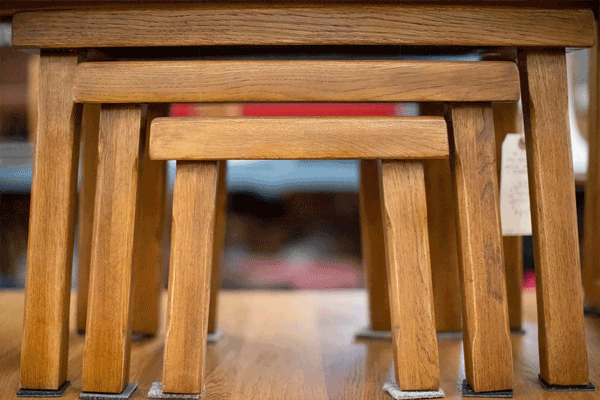Getting a a Piece of the Auction
- Share via
The trouble with auctions, many people think, is that they’re not for the rest of us. They’re for the wealthy or frantic folk who get juiced outbidding one another.
Those first impressions are fostered by news reports of art selling for millions at Sotheby’s or movie scenes of characters one-upping one another for laughs. But the reality is much different, said Leslie Hindman.
Hindman, a veteran auctioneer, has written “Adventures at the Auction” ($27.50, Clarkson Potter Publishing, 2001), which tries to demystify auctions, whether they’re live or online, and reveal them as bargain bazaars for furniture and other home decor pieces.
“When I first got into the auction business [more than 20 years ago], I didn’t know much about them,” Hindman said during a phone interview while promoting her book in Chicago. “But I did know that people are deathly scared of them. They feel intimidated, confused and out of place.
“But what they don’t get is how simple they actually are. You just have to know how they work.”
She said you can get prices closer to wholesale than retail if you do your homework and don’t overbid.
How do you do that? Study a list of the items up for auction; that list will detail the pieces’ backgrounds and, most important, have a price range of what they might go for. Many times the pieces (with price ranges) are exhibited four or five days before going on the block.
And keep your head: “Overbidding can be a problem, that’s for sure,” said Hindman, who conceded she sometimes paid too much in her early auctioning days. “Make sure you don’t get carried away, and always have a top price in your mind of what you can’t go over. And stick to it.”
Besides getting the price list, you should be assertive by approaching one of the people running the auction and asking for information. “If you’re looking at a chest-of-drawers [before the auction begins], find out about its age, its condition, its history, what they think of it,” she said. “It’s always good to have questions ready.”
One of the misconceptions is that upscale houses such as Sotheby’s and Christie’s are the only ones doing business. In fact, Hindman said, there are many middle-scale houses with regular auctions and other venues specializing in estate sales.
How do you find them? Classified ads are a good place, and don’t forget the yellow pages. And take the time to check with banks.
Hindman said to ask for the trust department, which tends to handle property liquidations from deaths, divorces and the like, and they’ll probably have dates and locations.
OK, so you’ve found an auction, now what? Hindman said there are bargains to look for: upholstered furniture, chandeliers, dinner services and stemware, silver flatware, monogrammed objects, old books, jewelry, minor contemporary works of art, large-scale furniture and box lots--when the auction house compiles an array of pieces that don’t fall into a specific category.
Take monogrammed items, for instance. Hindman said you can get beautiful clothing and silver services for little, just because they have someone else’s initials.
“If you still feel funny about owning something etched with ‘TRC’ when your initials are ‘LSH,’ think about it this way,” she writes. “You would cherish a monogrammed silver cigarette case or set of linen sheets inherited from your great-aunt, and chances are her initials wouldn’t match yours either.”
And what about box lots? Check these lots closely, Hindman said, and maybe you’ll notice a valuable antique hidden among the knickknacks--small figurines, candlesticks, bowls, vases and photographs.
Hindman also has suggestions for those who prefer going online, either at EBay or other auction sites. Let’s say you find something appealing but aren’t sure of its value. There are experts, Hindman said, at EBay and other sites who will respond to e-mail questions.
Finally, don’t hesitate to e-mail the person auctioning the piece. “Ask about the history, the condition and whatever else strikes you,” Hindman said. “I really think most people are honest on EBay and you’ll get straight answers.”
More to Read
Sign up for our Book Club newsletter
Get the latest news, events and more from the Los Angeles Times Book Club, and help us get L.A. reading and talking.
You may occasionally receive promotional content from the Los Angeles Times.










